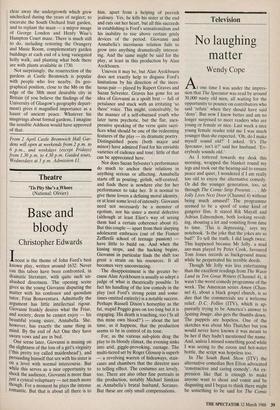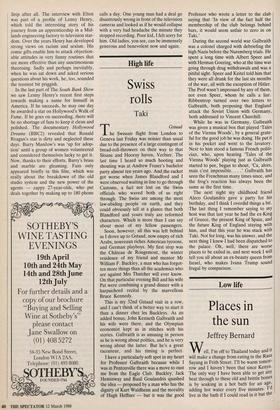Television
No laughing matter
Wendy Cope
t one time I was under the impres- sion that The Spectator was read by around 30,000 nasty old men, all waiting for the opportunity to pounce on contributors who said 'refute' when they should have said 'deny'. But now I know better and am no longer surprised to meet readers who are young or female or nice. Last week a nice young female reader told me I was much younger than she expected. 'Oh, do I make myself sound old?' I asked. 'It's The Spectator, isn't it?' said her husband. 'Ev- erybody sounds old.'
As I tottered towards my desk this morning, wrapped the blanket round my legs and took out the hearing-aid to ensure peace and quiet, I wondered if I am really too old to enjoy the alternative comedy. Or did the younger generation, too, sit through The Comic Strip Presents . . . Mr Jolly Lives Next Door (Channel 4) without being much amused? The programme seemed to be a spoof of some kind of gangster film. It stared Rik Mayall and Adrian Edmondson, both looking revolt- ing, shouting a lot and vomiting from time to time. 'This is depressing,' says my notebook. 'Is the joke that the jokes are so bad?' To tell the truth, I did laugh twice. This happened because Mr Jolly, a mad axe-man played by Peter Cook, favoured Tom Jones records as background music while he perpetrated his terrible deeds.
Though Mr Jolly was less entertaining than the excellent readings from The Waste Land in Ten Great Writers (Channel 4), it wasn't the worst comedy programme of the week. The American series Amen (Chan- nel 4), about a black gospel church, is so dire that the commercials are a welcome relief. D.C. Follies (ITV), which is ap- parently trying to be America's answer to Spitting Image, also gets the thumbs down. The puppets are hopeless. One of the sketches was about Mrs Thatcher but you would never have known it was meant to be her if they hadn't mentioned the name. And, unless I missed something good while I was seeing to the cocoa and hot-water bottle, the script was hopeless too.
In The South Bank Show (ITV) the alternative comedian Ben Elton advocated 'constructive and caring comedy'. An ex- pression like that is enough to make anyone want to shout and vomit and be disgusting and I began to think there might be something to be said for The Comic Strip after all. The interview with Elton was part of a profile of Lenny Henry, which told the interesting story of his journey from an apprenticeship in a Mid- lands engineering factory to television star- dom. Over the years Henry has developed strong views on racism and sexism. His comic gifts enable him to attack objection- able attitudes in very funny routines that are more effective than any sanctimonious theorising. Sadly and perhaps inevitably, when he was sat down and asked serious questions about his work, he, too, sounded the teeniest bit priggish.
In the last part of The South Bank Show we saw Lenny Henry's recent first steps towards making a name for himself in America. If he succeeds, he may one day be awarded a star on Hollywood's Walk of Fame. If he goes on succeeding, there will be no shortage of fans to keep it clean and polished. The documentary Hollywood Dreams (BBC2) revealed that Ronald Reagan's star is dirty and neglected these days. Barry Manilow's was `up for adop- tion' until a group of women volunteered and considered themselves lucky to get it. Now, thanks to their efforts, Barry's brass and marble are gleaming. Fans only appeared briefly in this film, which was really about the breakdown of the old studio system and the new power of the agents — zappy 27-year-olds, who put deals together by making up to 180 phone calls a day. One young man had a deal go disastrously wrong in front of the television cameras and looked as if he would collapse with a very bad headache the minute they stopped recording. Poor kid, I felt sorry for him. Old ladies, you see, can be immensely generous and benevolent now and again.



















































 Previous page
Previous page